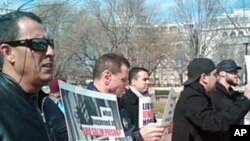As protest and government crackdowns in Libya continue, Libyans in the United States are fearing for the lives of their families and friends in their homeland.
Najla is a graduate student in Boston, Massachusetts. She does not give her last name for fear of her family being targeted by the government of Libya's longtime leader Moammar Gadhafi.
She says she calls her family as much as possible to make sure they are safe from the bloody anti-government demonstrations that are gripping the country.
"They are saying that the situation is so worse," said Najla. "They are really afraid. I wont say afraid; they are really scared and panicked right now."
Najla recounts what her family as told her about the situation in Libya.
"I don't even have words to describe what they are facing there each day - gun shots, heavy weapons," she said. "But they are totally, totally unarmed innocent people. I have to say it's a genocide; it's a massacre what's going on there. I have no other words to explain."
Saddik, who studies engineering at the University of Maryland, does not give his full name for the same reason as Najla. Still he says the situation in Libya is so bad that he is willing to speak out, despite the risk.
"I am sure now they are listening to me and they will interpret my voice and go to my family in Tripoli," said Saddik. "I am sure they will do that. I am asking my God to protect them."
These concerns were reaffirmed on Tuesday when Libyan leader Moammar Gadhafi addressed his nation. Pounding his fist on the podium, MR. Gadhafi threatened the death penalty for anyone who takes up arms against Libya or takes part in espionage.
Libyan human rights activist Aly Abuzaakouk, who is the executive director of the Libyan Human and Political Development Forum here in Washington, says he wishes he could join the protesters. He says he is in close contact with his friends and colleagues in Libya to see how he can take part in the demonstrations.
"I feel sorry I am not with them," said Abuzaakouk. "But at the same time, I try to convey the message. I try to call them, bring them support in whatever capacity."
Abuzaakouk says he is leading efforts to contact members of the U.S. Congress and President Barack Obama to get humanitarian help to protesters in Libya and to spread the word about what is going on inside the country through the media.
Many Libyans, including Aly Abuzaakouk, say the United States should play a role in ending Mr. Gadhafi's 41-year rule.
"The U.S. is a superpower; it is still the only superpower," he said. "And we know when a superpower, which is in complete coordination with the European Union, wants to do something, they can do it. It's a matter of are they interested only in oil or in the human rights, human suffering and the ending of human suffering of the Libyan people."
U.S. Secretary of State Hillary Clinton on Tuesday called the bloodshed in Libya "unacceptable." She said the United States is watching the developments in Libya with "alarm" and "grave concern."
Clinton said the Libyan government must take action to end the violence and respect the universal rights of all of its citizens.
Libyans in US Fear for Family and Friends Back Home




